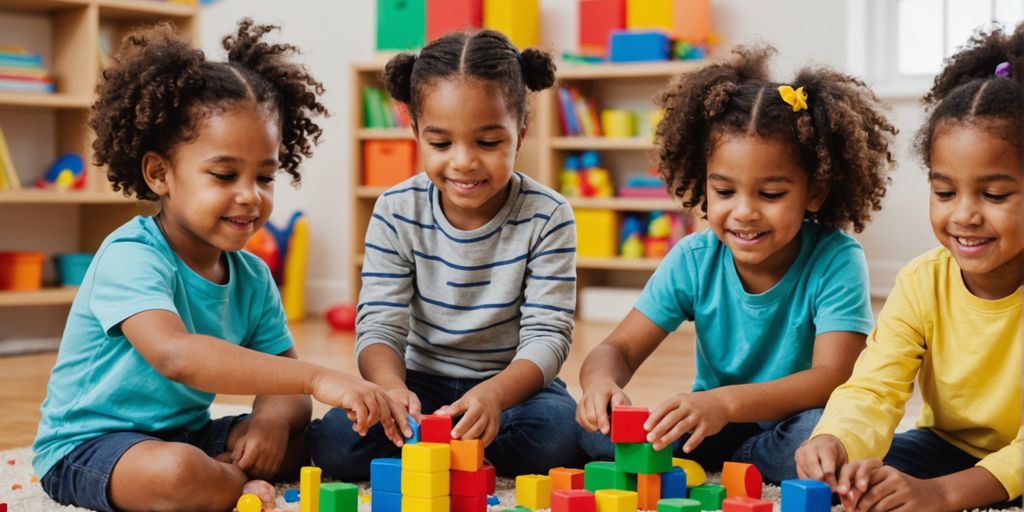
Understanding the stages of child development is crucial for parents, caregivers, and educators. It helps in providing the right support at the right time, ensuring that children grow up healthy and well-rounded. This guide will take you through the different stages, from prenatal development to adolescence, highlighting key milestones and offering practical advice for fostering growth.
Key Takeaways
- Recognizing the stages of child development helps in tailoring support to meet children’s needs at each phase.
- Early understanding of child development can lead to long-term benefits in a child’s physical, cognitive, and emotional well-being.
- Parents and caregivers play a crucial role in a child’s development and can make informed decisions with the right knowledge.
- Each stage of development, from prenatal to adolescence, has unique milestones and challenges.
- Supporting healthy development involves a combination of education, mental health awareness, and active parental involvement.
The Importance of Understanding Child Development
Holistic Development and Its Impact
Child development is a complex process that includes physical, cognitive, emotional, and social growth. Understanding this holistic development helps us see how different areas of growth are connected. For example, when a child learns to walk, they not only gain mobility but also explore their environment, which boosts their cognitive and emotional development.
Role of Parents and Caregivers
Parents and caregivers play a crucial role in a child’s development. Responsive caregiving, where caregivers respond to a child’s needs promptly, fosters secure attachment. Securely attached children tend to have better social skills and emotional regulation. Early childhood education also results in better concentration, communication, and listening skills.
Long-term Benefits of Early Understanding
Understanding child development early on has long-term benefits. It helps in identifying developmental delays and challenges, allowing for timely interventions. Early learning shapes a child’s life, impacting their future success. By recognizing and supporting a child’s developmental stages, we can help them achieve their full potential.
The Foundation of Growth: Prenatal to Infancy
Stages of Prenatal Development
Prenatal development is a remarkable journey that begins at conception and continues until birth. During this time, a single fertilized egg transforms into a fully formed baby. Key milestones include the development of the neural tube, the heartbeat, and sensory organs. Proper maternal nutrition and avoiding harmful substances are crucial for healthy development.
Critical Milestones in Infancy
Infancy is marked by rapid physical and cognitive growth. Babies progress from being helpless newborns to active explorers. They learn to lift their heads, roll over, sit up, crawl, and eventually walk. Proper nutrition, such as breast milk or formula, is essential for brain development and overall health. Responsive caregiving helps infants form secure attachments and develop social skills.
Influence of Early Nutrition and Care
Early nutrition and care have a lasting impact on a child’s development. Breast milk or formula provides the necessary nutrients for growth. Regular check-ups ensure that the baby is developing properly. A safe and stimulating environment encourages exploration and learning, laying a strong foundation for future growth.
Early Childhood: Building Blocks of Independence
Language and Communication Skills
During early childhood, children experience a rapid expansion in their language abilities. They start forming sentences, asking questions, and engaging in conversations. Regular reading and talking to your child will broaden their vocabulary. Encouraging them to express their thoughts and feelings helps in developing strong communication skills.
Emotional and Social Development
In this stage, children begin to understand and manage their emotions better. They form genuine friendships and learn to share and cooperate with others. Engaging in parallel play—where children play alongside but not directly with peers—helps them observe and imitate social behaviors. Setting up playdates and group activities can foster these social skills.
Physical Growth and Motor Skills
Early childhood is marked by significant physical development. Children gain better control over their bodies, mastering skills like running, jumping, and climbing. Providing opportunities for active play is essential for their physical growth. Learning to follow routines is one way for little kids to become more independent. For example, coming home from school: jacket off, then shoes, hang up backpack, wash hands. This not only builds independence but also instills a sense of responsibility.
Early childhood is a vibrant canvas where cognitive leaps and social connections intertwine. As caregivers, educators, and society, we must nurture these milestones, celebrating each child’s unique journey toward understanding, empathy, and resilience.
Middle Childhood: Expanding Horizons
Cognitive Development and Learning
During middle childhood, children experience significant growth in their thinking abilities. They move from simple thoughts to more complex ideas. Concrete operational thinking becomes prominent, allowing them to understand logical operations and principles. For example, they can now grasp that rearranging objects doesn’t change their total number. School plays a crucial role in this stage, as children learn to read, write, and solve math problems. Their curiosity drives them to explore various subjects, from science to history.
Social Interactions and Friendships
Friendships become very important during this stage. Children form close bonds with their peers, learning about loyalty, trust, and cooperation. They navigate conflicts and find ways to resolve them, which helps in building strong relationships. These interactions teach them empathy and understanding of others’ emotions. Peer relationships are essential for their social development.
Physical and Emotional Well-being
Physical growth continues steadily, and children become more coordinated and skilled in various activities. They also develop better emotional regulation, learning to manage their feelings and cope with disappointment and joy. This period is crucial for building a positive self-concept and self-esteem. Children start to understand their strengths and weaknesses, which helps them build a sense of identity and confidence.
Middle childhood is a dynamic phase where knowledge blossoms, friendships flourish, and emotional awareness deepens. Understanding these intricacies allows us to support children effectively as they navigate this critical period of development.
Adolescence: Navigating Changes
Adolescence is a time of significant transformation, both physically and emotionally. Understanding these changes can help parents and caregivers provide the necessary support during this critical stage.
Physical and Hormonal Changes
During adolescence, teenagers experience a surge in hormones that trigger the development of secondary sexual characteristics. Girls may notice breast development and the onset of menstruation, while boys might see the growth of facial hair and a deepening voice. These biological shifts can sometimes lead to awkwardness and self-consciousness.
Identity and Self-Concept
Adolescents often grapple with questions about their identity, such as "Who am I?" and "Where do I fit in?" This period of self-discovery involves exploring different roles and affiliations. Peer influence becomes particularly strong, affecting everything from clothing choices to hobbies.
Adolescence is a time of big social changes and emotional changes for your child. Here’s what to expect and how to support your child through the changes.
Peer Influence and Relationships
Friends become central to an adolescent’s life, often influencing their decisions and behaviors. Romantic relationships may also begin to form, bringing both the excitement of first love and the potential for heartbreak. It’s crucial for teens to have a supportive environment to navigate these new experiences safely.
Pre-teens and teens go through many physical, emotional, social, and cognitive changes in adolescence. Your support will help your child handle the changes.
Supporting Healthy Development Throughout Childhood

Role of Education and Extracurricular Activities
Education and extracurricular activities play a crucial role in a child’s development. Quality early education lays the foundation for lifelong learning. Engaging in activities like sports, music, and arts helps children develop creativity and social skills. These activities also provide opportunities for children to explore their interests and talents.
Importance of Mental Health
Positive experiences and safe, stable relationships help children develop skills they need to manage their emotions, solve problems, and develop close relationships. Encouraging emotional intelligence and resilience is essential. Teaching mindfulness techniques can empower children to navigate life’s challenges effectively.
Parental Involvement and Support Systems
Parents and caregivers are vital in supporting healthy development. Being involved in a child’s education and extracurricular activities shows that you value their interests and efforts. Additionally, creating a supportive home environment where children feel safe and loved is crucial. Community support systems, such as mentorship programs and safe parks, also play a significant role in fostering a child’s growth.
Supporting healthy child development requires a collaborative effort from parents, educators, communities, and policymakers. By recognizing the interconnectedness of physical, cognitive, emotional, and social aspects, we can create an environment where every child thrives.
Conclusion
In conclusion, understanding the stages of child development is essential for anyone involved in raising or caring for children. Each stage, from infancy to adolescence, comes with its own set of milestones and challenges. By being aware of these stages, parents, caregivers, and educators can provide the right support and create nurturing environments that promote healthy growth. Remember, every child is unique and may develop at their own pace, but having a solid grasp of these developmental stages helps in guiding them effectively. Let’s celebrate the journey of growth and commit to fostering the potential within every child.
Frequently Asked Questions
Why is it important to understand child development?
Understanding child development helps parents and caregivers provide the right support at each stage, fostering physical, cognitive, emotional, and social growth.
What are the main stages of child development?
The main stages include prenatal development, infancy, early childhood, middle childhood, and adolescence.
How can parents support their child’s development?
Parents can support their child’s development by providing a nurturing environment, encouraging learning and play, and being involved in their education and activities.
What are some critical milestones in infancy?
Critical milestones in infancy include rolling over, sitting up, crawling, and beginning to speak.
How does early nutrition impact child development?
Early nutrition is crucial for brain development, physical growth, and overall health. Proper nutrition helps children reach developmental milestones on time.
What role do peers play in a child’s development?
Peers influence social skills, self-esteem, and behavior. Positive peer interactions can promote healthy social and emotional development.






